高中英语选修六知识点总结
- 格式:doc
- 大小:79.00 KB
- 文档页数:19
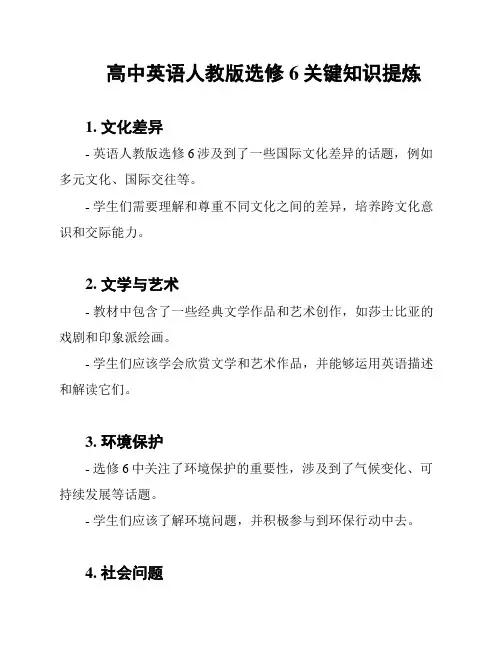
高中英语人教版选修6关键知识提炼
1. 文化差异
- 英语人教版选修6涉及到了一些国际文化差异的话题,例如多元文化、国际交往等。
- 学生们需要理解和尊重不同文化之间的差异,培养跨文化意识和交际能力。
2. 文学与艺术
- 教材中包含了一些经典文学作品和艺术创作,如莎士比亚的戏剧和印象派绘画。
- 学生们应该学会欣赏文学和艺术作品,并能够运用英语描述和解读它们。
3. 环境保护
- 选修6中关注了环境保护的重要性,涉及到了气候变化、可持续发展等话题。
- 学生们应该了解环境问题,并积极参与到环保行动中去。
4. 社会问题
- 教材中还涉及了一些社会问题,如青少年犯罪、贫困等。
- 学生们需要思考和讨论这些问题,并提出解决方案。
5. 学术写作
- 选修6着重培养学生的学术写作能力,包括论述和议论文的写作技巧。
- 学生们需要学会构思、组织和表达自己的观点,并能够用正确的英语表达出来。
以上是高中英语人教版选修6的关键知识提炼,希望对您有帮助。
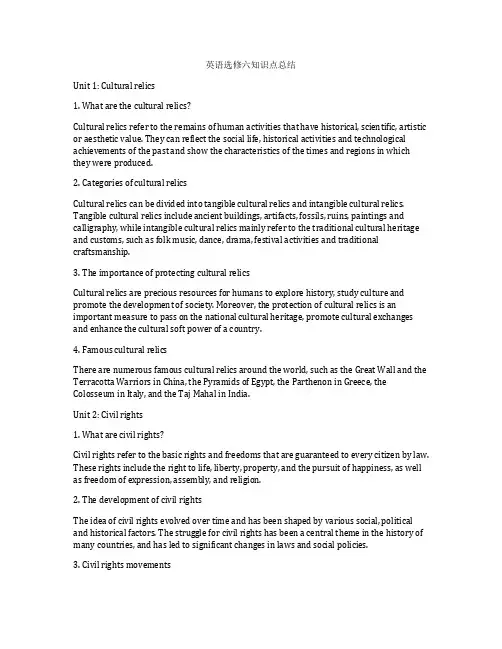
英语选修六知识点总结Unit 1: Cultural relics1. What are the cultural relics?Cultural relics refer to the remains of human activities that have historical, scientific, artistic or aesthetic value. They can reflect the social life, historical activities and technological achievements of the past and show the characteristics of the times and regions in which they were produced.2. Categories of cultural relicsCultural relics can be divided into tangible cultural relics and intangible cultural relics. Tangible cultural relics include ancient buildings, artifacts, fossils, ruins, paintings and calligraphy, while intangible cultural relics mainly refer to the traditional cultural heritage and customs, such as folk music, dance, drama, festival activities and traditional craftsmanship.3. The importance of protecting cultural relicsCultural relics are precious resources for humans to explore history, study culture and promote the development of society. Moreover, the protection of cultural relics is an important measure to pass on the national cultural heritage, promote cultural exchanges and enhance the cultural soft power of a country.4. Famous cultural relicsThere are numerous famous cultural relics around the world, such as the Great Wall and the Terracotta Warriors in China, the Pyramids of Egypt, the Parthenon in Greece, the Colosseum in Italy, and the Taj Mahal in India.Unit 2: Civil rights1. What are civil rights?Civil rights refer to the basic rights and freedoms that are guaranteed to every citizen by law. These rights include the right to life, liberty, property, and the pursuit of happiness, as well as freedom of expression, assembly, and religion.2. The development of civil rightsThe idea of civil rights evolved over time and has been shaped by various social, political and historical factors. The struggle for civil rights has been a central theme in the history of many countries, and has led to significant changes in laws and social policies.3. Civil rights movementsThroughout history, there have been numerous civil rights movements that have sought to secure and expand the rights and freedoms of marginalized groups, such as women, racial minorities, LGBTQ communities, and people with disabilities. These movements have played a crucial role in advancing the principles of equality and justice in society.4. Current civil rights issuesIn today's world, civil rights continue to be a significant issue, with ongoing debates and challenges related to racial discrimination, gender equality, LGBTQ rights, immigrant rights, and the protection of human rights in the digital age.Unit 3: Language1. The nature of languageLanguage is a system of communication that uses symbols, such as words and gestures, to convey meaning. It is a uniquely human ability and serves as a fundamental tool for expressing thoughts, emotions, and ideas.2. The functions of languageLanguage serves several functions, including expressing thoughts, emotions, and desires, conveying information, establishing and maintaining social relationships, and preserving cultural traditions.3. The characteristics of languageLanguage has several key characteristics, such as arbitrariness, duality, productivity, displacement, and cultural transmission, which distinguish it from other forms of communication and contribute to its complexity and richness.4. The diversity of languagesThere are thousands of languages spoken around the world, each with its own unique structure, vocabulary, and cultural significance. Language diversity reflects the rich tapestry of human experience and highlights the importance of linguistic diversity in preserving the cultural heritage of different communities.In conclusion, the study of cultural relics, civil rights, and language in English 6 provides valuable insights into the richness and complexity of human experience. These topics offer important opportunities for students to explore history, society, and culture, and to develop a deeper understanding of the world around them. By engaging with these knowledge points, students can gain a deeper appreciation for the diversity of human experience and the importance of protecting and preserving our shared cultural heritage.。
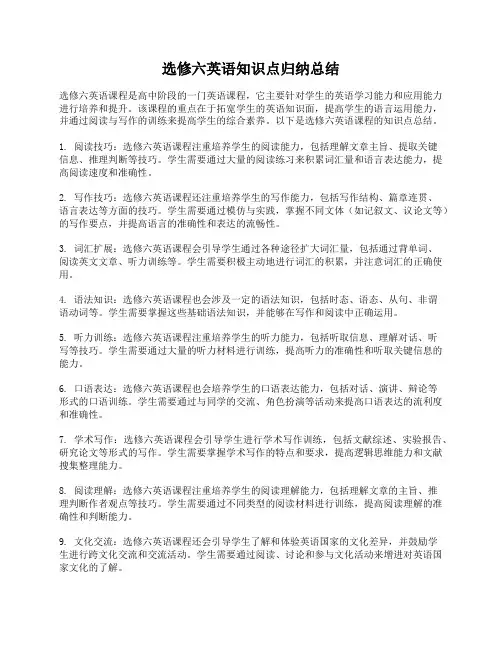
选修六英语知识点归纳总结选修六英语课程是高中阶段的一门英语课程,它主要针对学生的英语学习能力和应用能力进行培养和提升。
该课程的重点在于拓宽学生的英语知识面,提高学生的语言运用能力,并通过阅读与写作的训练来提高学生的综合素养。
以下是选修六英语课程的知识点总结。
1. 阅读技巧:选修六英语课程注重培养学生的阅读能力,包括理解文章主旨、提取关键信息、推理判断等技巧。
学生需要通过大量的阅读练习来积累词汇量和语言表达能力,提高阅读速度和准确性。
2. 写作技巧:选修六英语课程还注重培养学生的写作能力,包括写作结构、篇章连贯、语言表达等方面的技巧。
学生需要通过模仿与实践,掌握不同文体(如记叙文、议论文等)的写作要点,并提高语言的准确性和表达的流畅性。
3. 词汇扩展:选修六英语课程会引导学生通过各种途径扩大词汇量,包括通过背单词、阅读英文文章、听力训练等。
学生需要积极主动地进行词汇的积累,并注意词汇的正确使用。
4. 语法知识:选修六英语课程也会涉及一定的语法知识,包括时态、语态、从句、非谓语动词等。
学生需要掌握这些基础语法知识,并能够在写作和阅读中正确运用。
5. 听力训练:选修六英语课程注重培养学生的听力能力,包括听取信息、理解对话、听写等技巧。
学生需要通过大量的听力材料进行训练,提高听力的准确性和听取关键信息的能力。
6. 口语表达:选修六英语课程也会培养学生的口语表达能力,包括对话、演讲、辩论等形式的口语训练。
学生需要通过与同学的交流、角色扮演等活动来提高口语表达的流利度和准确性。
7. 学术写作:选修六英语课程会引导学生进行学术写作训练,包括文献综述、实验报告、研究论文等形式的写作。
学生需要掌握学术写作的特点和要求,提高逻辑思维能力和文献搜集整理能力。
8. 阅读理解:选修六英语课程注重培养学生的阅读理解能力,包括理解文章的主旨、推理判断作者观点等技巧。
学生需要通过不同类型的阅读材料进行训练,提高阅读理解的准确性和判断能力。
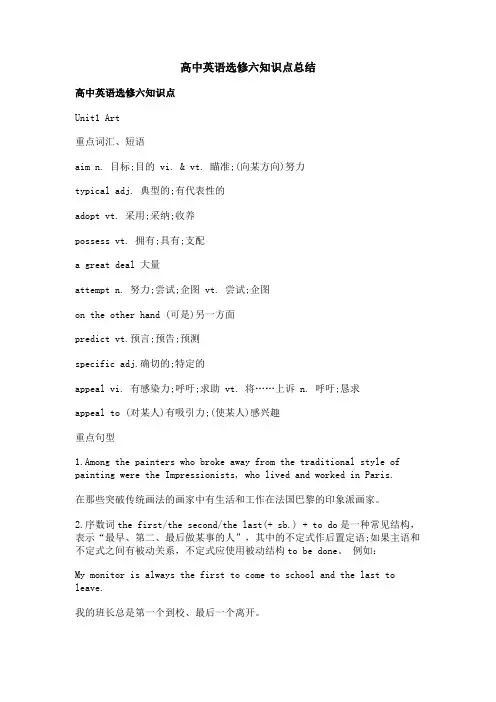
高中英语选修六知识点总结高中英语选修六知识点Unit1 Art重点词汇、短语aim n. 目标;目的 vi. & vt. 瞄准;(向某方向)努力typical adj. 典型的;有代表性的adopt vt. 采用;采纳;收养possess vt. 拥有;具有;支配a great deal 大量attempt n. 努力;尝试;企图 vt. 尝试;企图on the other hand (可是)另一方面predict vt.预言;预告;预测specific adj.确切的;特定的appeal vi. 有感染力;呼吁;求助 vt. 将……上诉 n. 呼吁;恳求appeal to (对某人)有吸引力;(使某人)感兴趣重点句型1.Among the painters who broke away from the traditional style of painting were the Impressionists, who lived and worked in Paris.在那些突破传统画法的画家中有生活和工作在法国巴黎的印象派画家。
2.序数词the first/the second/the last(+ sb.) + to do是一种常见结构,表示“最早、第二、最后做某事的人”,其中的不定式作后置定语;如果主语和不定式之间有被动关系,不定式应使用被动结构to be done。
例如:My monitor is always the first to come to school and the last to leave.我的班长总是第一个到校、最后一个离开。
To tell the truth, he was the last person to be met with by the manager.说实话,他是最后一个被经理接见的人。
3.It is amazing/surprising/astonishing/shocking that...是一种常见句型,表示“……令人吃惊、震惊、惊讶等”,其中it是形式主语,that引导主语从句作句子的真正主语。
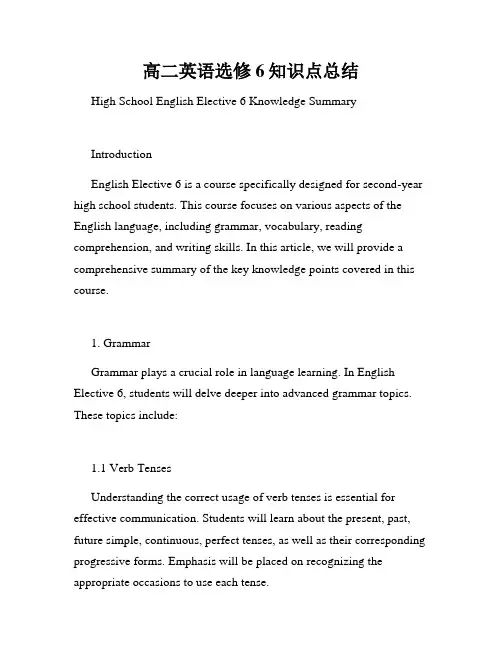
高二英语选修6知识点总结High School English Elective 6 Knowledge SummaryIntroductionEnglish Elective 6 is a course specifically designed for second-year high school students. This course focuses on various aspects of the English language, including grammar, vocabulary, reading comprehension, and writing skills. In this article, we will provide a comprehensive summary of the key knowledge points covered in this course.1. GrammarGrammar plays a crucial role in language learning. In English Elective 6, students will delve deeper into advanced grammar topics. These topics include:1.1 Verb TensesUnderstanding the correct usage of verb tenses is essential for effective communication. Students will learn about the present, past, future simple, continuous, perfect tenses, as well as their corresponding progressive forms. Emphasis will be placed on recognizing the appropriate occasions to use each tense.1.2 Sentence StructureSentence structure is the backbone of English syntax. Students will learn about the different sentence types, such as declarative, interrogative, imperative, and exclamatory sentences. Additionally, they will study complex sentences, compound sentences, and the correct usage of clauses and phrases within a sentence.1.3 Parts of SpeechA solid understanding of parts of speech is necessary for constructing accurate sentences. Students will explore the functions and classifications of nouns, pronouns, verbs, adjectives, adverbs, prepositions, conjunctions, and interjections. They will also learn about subject-verb agreement and the correct use of articles.2. VocabularyExpanding one's vocabulary is crucial for enhancing language proficiency. In English Elective 6, students will encounter a wide range of vocabulary items. These include:2.1 Word FormationStudents will study the formation of words through prefixes, suffixes, and root words. This knowledge will enable them to decode unfamiliar words and understand their meanings within different contexts.2.2 Synonyms, Antonyms, and HomonymsLearning synonyms, antonyms, and homonyms will assist students in developing a nuanced understanding of vocabulary. They will learn how to differentiate between words with similar or opposite meanings and understand how context affects word usage.2.3 Idioms and Phrasal VerbsIdioms and phrasal verbs are common expressions in the English language. Students will explore their meanings and usage, enabling them to communicate more naturally and fluently.3. Reading ComprehensionEffective reading comprehension skills are crucial for understanding various types of texts. In English Elective 6, students will develop the following reading skills:3.1 Skimming and ScanningSkimming and scanning are techniques that help readers quickly gather information from a text. Students will practice these skills to locate specific details and main ideas efficiently.3.2 Inference and DeductionStudents will enhance their ability to make inferences and deduce information that may not be directly stated in the text. They will learn to analyze the context and use clues to understand implicit meanings.3.3 Critical Thinking and AnalysisDeveloping critical thinking skills is essential for analyzing and interpreting texts. Students will learn how to evaluate the credibility of information, recognize bias, and identify the main arguments and supporting evidence presented.4. Writing SkillsStrong writing skills enable effective communication and expression of ideas. English Elective 6 emphasizes the following aspects of writing:4.1 Essay WritingStudents will learn how to structure and organize their ideas effectively when writing essays. They will practice writing introductions, body paragraphs, and conclusions, while also mastering the use of appropriate academic language and cohesive devices.4.2 Formal and Informal WritingUnderstanding the differences between formal and informal writing styles is crucial. Students will learn to adapt their writing to different contexts, such as academic essays, letters, emails, and social media posts.4.3 Sentence Variety and CohesionDeveloping sentence variety and cohesion improves the overall flow and readability of a piece of writing. Students will practice using different sentence structures, transition words, and phrases to connect ideas smoothly.ConclusionEnglish Elective 6 covers a wide range of knowledge points, including grammar, vocabulary, reading comprehension, and writing skills. By developing a strong foundation in these areas, second-yearhigh school students can enhance their English language proficiency and effectively communicate in various contexts.。

(完整word版)人教版高中英语选修六知识点总结Unit 1I词汇及结构1. would rather do sth情愿做….would rather sb did sth情愿sb做…情愿做….而不愿意做…:would rather do sth than do sth= would do sth rather than do sth= prefer to do sth rather than do sth= prefer doing sth to doing sthI would rather stay at home today. 我今天宁愿待在家里。
I would rather you came here tomorrow. 我宁愿你明天来。
I would rather you hadn’t told me about it yesterday.我宁愿你昨天没有告诉我关于它。
2.faith n. 信任,信仰break one's faith with sb. 对某人不守信用keep faith with 忠于信仰; 守信I kept faith with him.我信守了对他的诺言。
He who loses faith, loses all.失去信心的人, 失去所有。
have faith in 相信, 信任in good faith 老实地;诚恳地faithful adj. 忠诚的,可靠的3.As there are so many different styles of Western art , it would be impossible to describe all of them in such a short text.so+adj+a(an)+(单数可数) (+that…)so many/few +n (复数) (+ that…)so much/little (不可数) (+that…)such+adj.+n.(不可数)/ n (复数)eg.1) The book is ________interesting that Iwant to read it again.2) It was ________a cold day that the ice inthe river was nearly two feet thick.3) It was _______cold a day that the ice inthe river was nearly two feet thick.4) There are _______many mistakes in yourcomposition that I can’t understand it.5) He has made ________rapid progress that he got the first in the exam.6) _______that Maric was able to set up new branches elsewhere.(07陕西)A. So successful her business wasB. So successful was her businessC. So her business was successfulD. So was her successful businessB4.consequently adv. 所以,因此I overslept and ____ I was late for work. 我睡过头了,所以我上班迟到了。
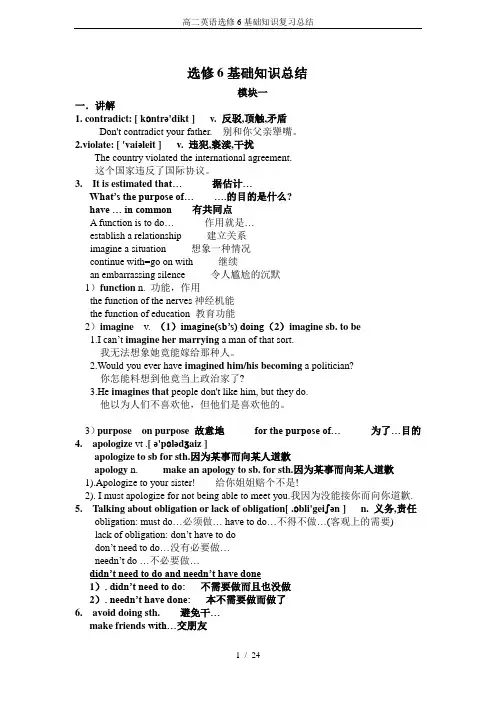
选修6基础知识总结模块一一.讲解1.contradict: [ kɔntrə'dikt ] v. 反驳,顶触,矛盾Don't contradict your father. 别和你父亲犟嘴。
2.violate: [ 'vaiəleit ] v. 违犯,亵渎,干扰The country violated the international agreement.这个国家违反了国际协议。
3. It is estimated th at… 据估计…What’s the purpose of… ….的目的是什么?have … in common 有共同点A function is to do… 作用就是…establish a relationship 建立关系imagine a situation 想象一种情况continue with=go on with 继续an embarrassing silence 令人尴尬的沉默1)function n. 功能,作用the function of the nerves神经机能the function of education 教育功能2)imagine v. (1)imagine(sb’s) doing(2)imagine sb. to be1.I can’t imagine her marrying a man of that sort.我无法想象她竟能嫁给那种人。
2.Would you ever have imagined him/his becoming a politician?你怎能料想到他竟当上政治家了?3.He imagines that people don't like him, but they do.他以为人们不喜欢他,但他们是喜欢他的。
3)purpose on purpose 故意地for the purpose of… 为了…目的4.apologize vt .[ ə'pɔlədʒaiz ]apologize to sb for sth.因为某事而向某人道歉apology n. make an apology to sb. for sth.因为某事而向某人道歉1).Apologize to your sister! 给你姐姐赔个不是!2). I must apologize for not being able to meet you.我因为没能接你而向你道歉.5. Talking about obligation or lack of obligation[ .ɔbli'geiʃən ] n. 义务,责任obligation: must do…必须做…have to do…不得不做…(客观上的需要)lack of obligation: don’t have to dodon’t need to do…没有必要做…needn’t do …不必要做…didn’t need to do and needn’t have done1). didn’t need to do: 不需要做而且也没做2). needn’t have done: 本不需要做而做了6. avoid doing sth. 避免干…make friends with…交朋友lack the confidence 缺乏信心(vt.)be nervous about/of 对…紧张at a social event 在社交活动中lack:1)for lack of…由于缺乏… (n.)The plants died for lack of water.2)lack…. = lack for….. 缺少(vi.)(通常与否定连用)She doe sn’t lack for friends.She lacks the experience3)no lack of …. …充足We have no lack of waterconfidence:1) He answered the questions with confidence.2) I have confidence in my ability.对….有信心7. social skills 社交技能have a conversation 说话do planning 做计划do advance planning 预先计划一下worry about 担心1) advance v. 行进, 推进(1)Our soldiers is advancing toward the enemy base.(2)She advanced the minute hand ten minutes. (向……)前进;她将分针调快了10分钟。
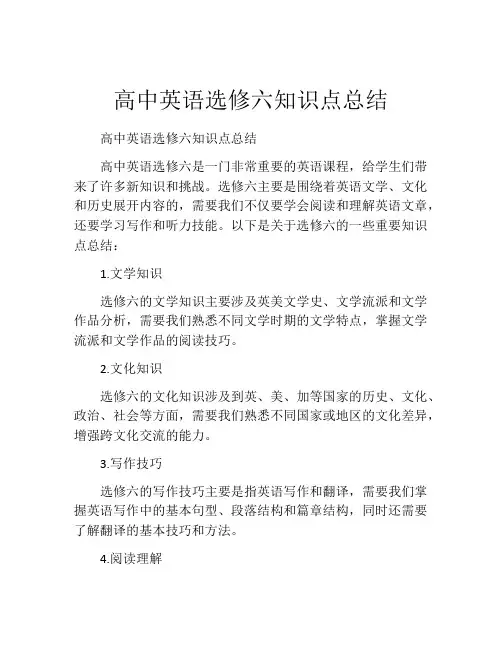
高中英语选修六知识点总结高中英语选修六知识点总结
高中英语选修六是一门非常重要的英语课程,给学生们带来了许多新知识和挑战。
选修六主要是围绕着英语文学、文化和历史展开内容的,需要我们不仅要学会阅读和理解英语文章,还要学习写作和听力技能。
以下是关于选修六的一些重要知识点总结:
1.文学知识
选修六的文学知识主要涉及英美文学史、文学流派和文学作品分析,需要我们熟悉不同文学时期的文学特点,掌握文学流派和文学作品的阅读技巧。
2.文化知识
选修六的文化知识涉及到英、美、加等国家的历史、文化、政治、社会等方面,需要我们熟悉不同国家或地区的文化差异,增强跨文化交流的能力。
3.写作技巧
选修六的写作技巧主要是指英语写作和翻译,需要我们掌握英语写作中的基本句型、段落结构和篇章结构,同时还需要了解翻译的基本技巧和方法。
4.阅读理解
选修六的阅读理解主要是针对英美文学作品进行的,需要我们在阅读时了解作者的写作风格、主题和意义等方面,同时也需要我们熟练运用阅读技巧,如猜词、推理和细节查找等。
5.听力技能
选修六的听力技能主要是指听力理解和口语表达,需要我们熟悉英语听力考试中的常见题型,如听力短对话、长对话、听力材料等,并且要了解常用的口语表达方式。
6.英语考试技巧
在英语考试中,有一些常见的技巧可以帮助我们更好地完成试卷,如肢体语言和眼神交流,同时还需要我们熟练掌握强化记忆和归纳总结等方法。
总体来说,选修六是一门需要我们在多个方面进行学习的英语课程,需要我们充分掌握各种技巧和方法,才能取得优异的成绩。
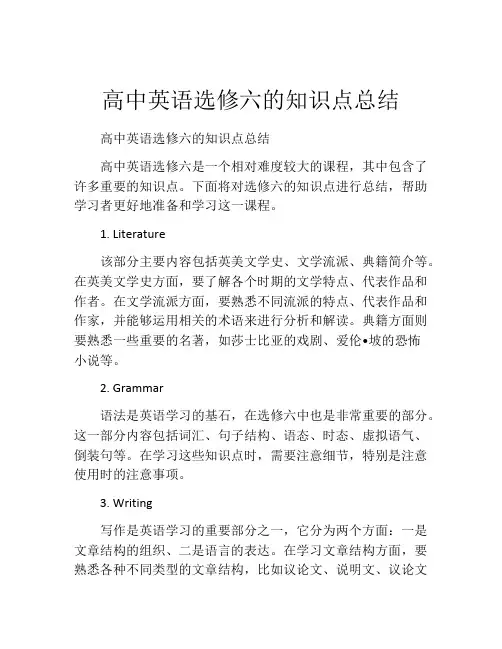
高中英语选修六的知识点总结高中英语选修六的知识点总结高中英语选修六是一个相对难度较大的课程,其中包含了许多重要的知识点。
下面将对选修六的知识点进行总结,帮助学习者更好地准备和学习这一课程。
1. Literature该部分主要内容包括英美文学史、文学流派、典籍简介等。
在英美文学史方面,要了解各个时期的文学特点、代表作品和作者。
在文学流派方面,要熟悉不同流派的特点、代表作品和作家,并能够运用相关的术语来进行分析和解读。
典籍方面则要熟悉一些重要的名著,如莎士比亚的戏剧、爱伦•坡的恐怖小说等。
2. Grammar语法是英语学习的基石,在选修六中也是非常重要的部分。
这一部分内容包括词汇、句子结构、语态、时态、虚拟语气、倒装句等。
在学习这些知识点时,需要注意细节,特别是注意使用时的注意事项。
3. Writing写作是英语学习的重要部分之一,它分为两个方面:一是文章结构的组织、二是语言的表达。
在学习文章结构方面,要熟悉各种不同类型的文章结构,比如议论文、说明文、议论文等。
在语言表达方面,要注意字词的准确性、词语搭配和句子结构。
4. Listening and Speaking听力和口语是语言能力的体现。
在选修六中,听力和口语的训练主要集中在理解听力材料和能够流利地表达自己的观点。
要锻炼听力和口语能力,可以通过听录音、看电视、参加英语角等方式来进行训练。
5. Reading and Comprehension阅读理解是英语学习的重要部分之一,它包括阅读理解和阅读技巧两个方面。
在阅读理解方面,要提高自己理解能力,能够从文章中获取信息、理解文章的意思和推测信息。
在阅读技巧方面,要掌握一些阅读技巧,在阅读过程中快速获取信息。
以上就是高中英语选修六的知识点总结,希望对大家有所帮助。
要想学好选修六,需要不断地练习和提高自己的英语实力,坚持不懈,定能取得好成绩。
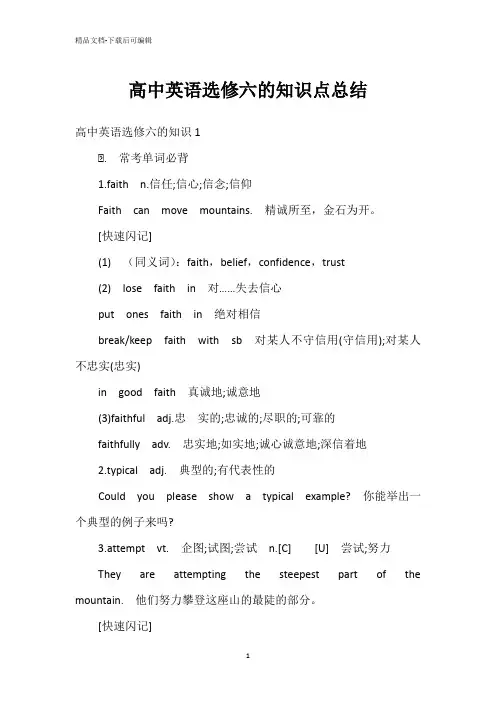
高中英语选修六的知识点总结高中英语选修六的知识1Ⅰ. 常考单词必背1.faith n.信任;信心;信念;信仰Faith can move mountains. 精诚所至,金石为开。
[快速闪记](1) (同义词):faith,belief,confidence,trust(2) lose faith in 对……失去信心put ones faith in 绝对相信break/keep faith with sb 对某人不守信用(守信用);对某人不忠实(忠实)in good faith 真诚地;诚意地(3)faithful adj.忠实的;忠诚的;尽职的;可靠的faithfully adv. 忠实地;如实地;诚心诚意地;深信着地2.typical adj. 典型的;有代表性的Could you please show a typical example? 你能举出一个典型的例子来吗?3.attempt vt. 企图;试图;尝试n.[C] [U] 尝试;努力They are attempting the steepest part of the mountain. 他们努力攀登这座山的最陡的部分。
[快速闪记](1)attempt to do/doing... 试图做……attempt at sth 试图做某事(2)make an attempt to do/at (doing) sth 试图做某事in an attempt to do sth 试图做某事at ones first attempt 某人第一次尝试(3)attempted adj. 未遂的;未成功的4.predict vt. 预言;预告;预料;预计Middle-aged adults (age 40 to 64) more accurately predicted how they would feel in the future. 中年人可以更加精确地预测他们的未来。
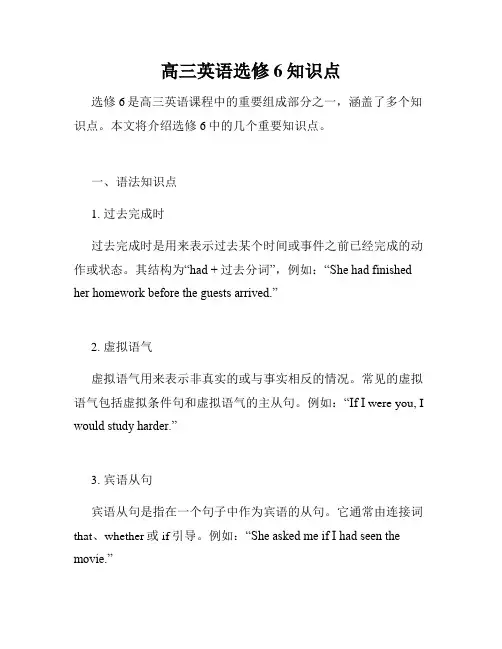
高三英语选修6知识点选修6是高三英语课程中的重要组成部分之一,涵盖了多个知识点。
本文将介绍选修6中的几个重要知识点。
一、语法知识点1. 过去完成时过去完成时是用来表示过去某个时间或事件之前已经完成的动作或状态。
其结构为“had + 过去分词”,例如:“She had finished her homework before the guests arrived.”2. 虚拟语气虚拟语气用来表示非真实的或与事实相反的情况。
常见的虚拟语气包括虚拟条件句和虚拟语气的主从句。
例如:“If I were you, I would study harder.”3. 宾语从句宾语从句是指在一个句子中作为宾语的从句。
它通常由连接词that、whether或if引导。
例如:“She asked me if I had seen the movie.”二、阅读技巧知识点1. 推断通过阅读理解文章中的线索并结合常识,我们可以推断出一些未明确提及的信息。
在进行推断时,要注意根据文章所提供的信息进行逻辑推理。
2. 判断在阅读理解中,经常需要进行判断题的选择。
为了正确判断,需要仔细阅读文章,理解文章的主旨和细节,并根据文章提供的线索做出合理的判断。
三、写作技巧知识点1. 议论文写作技巧议论文是一种需要表达自己观点的文章形式。
在写议论文时,要明确观点,并用事实、数据、论据等支持观点。
同时要注意语言表达的准确性和逻辑性。
2. 段落结构在写作中,每个段落应该有一个明确的主题句,用来概括段落的主要内容。
同时,段落之间应该有适当的过渡句,使文章结构更加紧密。
四、听力技巧知识点1. 注意听力材料的细节信息在听力理解中,细节信息常常是解答问题的关键。
细心听取材料中的具体细节,例如数字、时间、地点等,以便更好地理解和回答问题。
2. 多练习听力题型高考英语听力部分的题型多种多样,包括听力短文填空、听力选择题等。
为了熟悉和掌握各种题型的解题方法,平时要多进行听力练习。
选修六英语知识点归纳总结1. 阅读理解选修六英语要求学生具备较强的阅读理解能力,能够理解并分析各种文学作品、历史事件、科普知识等。
在阅读理解中,学生需要注意以下几个方面:1)文章结构:包括开头、中间和结尾,以及段落之间的逻辑关系。
2)语言特点:如修辞手法、比喻、象征、对比等。
3)主旨大意:把握文章的中心思想和主题。
4)细节理解:理解文章中的具体细节,例如时间、地点、人物等。
5)推理判断:根据文章中的信息进行推理判断,包括推断人物的心理活动、推测事件的发展等。
2. 写作能力选修六英语要求学生具备较强的写作能力,能够进行文学创作、议论文写作等。
在写作能力方面,学生需要注意以下几个方面:1)文体结构:了解不同文体的结构,如记叙文、议论文、说明文等。
2)语言组织:掌握文章开头、中间、结尾的叙述逻辑。
3)表达技巧:运用修辞手法、比喻、拟人等技巧进行表达。
4)内容丰富性:文章内容要有丰富性和深度,结构合理,条理清晰。
5)语言运用:要求对英语语法、词汇、句式等有较深入的理解和应用。
3. 语法知识选修六英语中的语法知识是学生英语学习的基础,包括句子结构、时态、语态、语气、句型、从句、状语从句、名词性从句等。
学生需要重点掌握以下几个方面的知识:1)时态:包括一般现在时、一般过去时、一般将来时、现在进行时、过去进行时、过去将来时等。
2)语态:包括主动语态和被动语态。
3)语气:包括陈述语气、疑问语气、祈使语气等。
4)句型:包括倒装句、虚拟语气、强调句、比较句等。
5)从句:包括定语从句、状语从句、名词性从句等。
4. 词汇量选修六英语要求学生具备一定的词汇量,能够熟练运用各类词汇进行听、说、读、写等方面的应用。
学生需要注意以下几个方面的词汇知识:1)常用词汇:包括日常生活中常用的词汇,如数字、颜色、家庭关系、学科名称、职业名称等。
2)高频词汇:包括高频单词和短语,如情感词汇、动词短语、形容词短语等。
3)专业词汇:包括与学科内容相关的专业词汇,如历史、地理、生物、化学、物理等学科的专业词汇。
---------------------------------------------------------------最新资料推荐------------------------------------------------------ 人教版高中英语选修6知识点总结汇总修选修 6 Unit 1 Art 1. faith n. 信任;信念;信心常用结构 break one s faith with sb. 对某人不守信用 keep faith with sb. 守信于某人 lose faith in 不再信任 have faith in 相信; 信任 in good/bad faith 真心诚意/ 虚情假意 2. aim n. 目标;目的 vi.vt. 瞄准;(向某方向)努力 What is your aim in life?你生活的目标是什么? 常用结构:take aim (at) 瞄准 aim at 向瞄准;旨在,针对 aim high 胸怀大志; 心气很高 3. consequently v.conj. 所以,因而(=therefore) 联想拓展consequent on/upon 因引起的;consequence n. 后果;结果;重要性 be of consequence 重要的 as a consequence=as a result 结果 in consequence 由于as a consequence of=as a result of 作为的结果 in consequence of 由于;作为的结果 4. possession (尤作复数)所有;财产常用结构:in possession of sth. 拥有/ 占有某物 in the possession of/in one s possession 被拥有 take/gain/get/have possession of sth. 拥有某物 possess vt. 拥有;具有;支配 5. concentrate vt. 集中, 浓缩常用结构:concentrate on/upon 集中在;专心于 concentrate one s attention/mind on 注意力集中在 focus on 集中( 注意力, 关1/ 17心) 于 fix ones attention/eyes/mind on 集中精力/ 目光/ 心思在 The children fixed their eyes on the teacher in class.孩子们聚精会神地听老师讲课。
高三英语选修六的知识点分析归纳英语基础知识的复习要以课本为纲,按照知识之间的内在联系,将它们进行分类整理.在这个过程中,要注意以新带旧,使初中和高中所学的知识形成系统, 总结出规律性,这样才能融会贯通,也才能把知识转化为能力.以下是小编给大家整理的高三英语选修六的知识点分析归纳,希望能帮助到你!英语中过去分词可作宾补, (此时的过去分词一般是及物动词)表被动意义或完成意义,有时两者兼而有之。
做宾补的过去分词与宾语有逻辑上的动宾关系,即宾语是过去分词动作的对象。
如:She found the door broken in when she came back. (宾补与宾语有被动的关系,表一种状态。
)一. 过去分词用在表状态的动词keep,leave 等的后面。
Eg:They kept the door locked for a long time.Keep your mouth shut and your eyes open. (谚语:少说多看)Don't leave such an important thing undone.Don't leave the windows broken like this all the time.二.过分词用在 get,have,make, 的后面。
1.注意“have +宾语+过去分词”的两种情况:A)表"让某人做某事/让某事(被人)做"eg: I have had my bike repaired.The villagers had many trees planted just then.B)表"遭遇到某种不幸,受到打击/受....影响,蒙受..... 损失"Eg:I had my wallet stolen on a bus last month.The old man had his leg broken in the accident.He had his leg broken in the match yesterday. (MET1986)2."make+宾语+过去分词",在这种结构中,过去分词的动词必须是表示结果含义的。
高二英语选修六相关知识点高二英语选修六是英语课程中的一门重要课程,涵盖了许多相关的知识点。
本文将介绍并总结高二英语选修六课程中的相关知识点,包括语法、词汇、阅读理解和写作技巧等内容。
一、语法知识点1. 时态和语态:选修六中会涉及到各种时态和语态的应用,如一般现在时、一般过去时、一般将来时、过去进行时、被动语态等。
在学习过程中,要注意掌握各种时态和语态的用法和表示方式。
2. 从句:从句是选修六中的重点内容之一,包括宾语从句、主语从句、定语从句和状语从句等。
了解从句的特点和用法,并能够正确运用于实际语言表达中。
3. 并列连词:选修六中还包括一些常用的并列连词,如and、but、or等。
了解这些连词的用法和连接两个或多个并列成分的方式,能够正确使用它们构成流畅的句子。
二、词汇知识点1. 同义词和近义词:选修六中会涉及到一定量的词汇学习,包括一些同义词和近义词的辨析。
掌握这些词汇的用法和区别,能够丰富自己的词汇量,提高语言表达能力。
2. 词根和词缀:了解一些常见的词根和词缀,能够帮助理解和记忆一些生词和短语。
同时,在写作中能够运用一些词根和词缀,丰富自己的表达方式。
三、阅读理解知识点1. skimming和scanning:选修六中会出现一些英文文章,包括短文、讲演稿、广告等。
掌握快速阅读的技巧,如略读和快速搜索关键词的能力,能够更好地理解文章的主旨和重点。
2. 理解文章结构和段落组织:选修六中的文章通常会有明确的结构和段落组织,如引言、主体、结论等。
了解文章结构和段落组织,能够更好地理解文章的逻辑关系和作者的意图。
四、写作技巧知识点1. 句子结构和篇章连贯:选修六中的写作要求考察句子结构的多样性和篇章连贯性。
要注意使用各种句型和连接词,使句子和段落之间流畅连贯,表达清晰准确。
2. 写作主题和观点:在选修六的写作中,关注主题和观点的准确表达。
要能够明确自己的写作目的和观点,并能用恰当的语言表达出来。
总结:高二英语选修六是一门综合性课程,涉及了语法、词汇、阅读理解和写作技巧等多个方面的知识点。
如果您喜欢这份文档,欢迎下载!来源网络,造福学生———————欢迎下载,祝您学习进步,成绩提升———————选修六知识点总结Unit 1I 词汇及结构1. would rather do sth 情愿做.would rather sb did sth 情愿sb 做情愿做.而不愿意做:would rather do sth than do sth= would do sth rather than do sth= prefer to do sth rather than do sth= prefer doing sth to doing sthI would rather you hadn’t told me about it yesterday.我宁愿你昨天没有告诉我关于它。
2.faith n. 信任,信仰be faithful to sb 忠实于某人keep faith with 忠于信仰; 守信have faith in 相信, 信任3. As there are so many different styles of Western art , it would be impossible to describe all of them in such a short text .so+adj+a(an)+( 单数可数) (+that )so many/few +n ( 复数) (+ that )so much/little ( 不可数) (+that )such+adj.+n.( 不可数)/ n (复数)eg.1) The book is interesting that I want to read it again.2) It was a cold day that the ice in the river was nearly two feet thick.3) It was cold a day that the ice in the river was nearly two feet thick.4) There are many mistakes in your composition that I can ’ t understand it.5) He has made rapid progress that he got the first in the exam.6) that Maric was able to set up new branches elsewhere. (07 陕西)A. So successful her business wasB. So successful was her businessC. So her business was successfulD. So was her successful business4. consequently adv. 所以,因此consequent adj. 作为结果的,随之发生的as a consequence/result = in consequence = soas a consequence/result of = because of5 .aimwithout aim 无目的的/ 无目标的(take)aim at 瞄准,对准sb/ sth’s aim is to do 的目标是.aim at doing = aim to do 瞄准, 力求做到,力争达到6.typical adj.典型的;具有代表性的;后接of7. evident 明白的, 明显的(apparent)be evident to sb. 对某人来说很明显be evident in sth 在某方面很明显8. adopt 采用,收养adapt 改编,使适应9. possess 用作动词时,不能用于进行时。
高二英语选修六重点知识点选修六是高二英语的重要学习内容,其中涵盖了许多重要的知识点。
本文将重点介绍选修六中的几个重要知识点,以帮助同学们更好地理解和掌握这些内容。
一、语法知识点1. 过去完成时态过去完成时态用来表示在过去某一时间或动作之前已经发生或完成的动作。
它的构成是“had + 过去分词”。
例如:He had already finished his homework when I arrived home.2. 条件状语从句条件状语从句用来表示某一情况下的可能结果。
常用的引导词有“if, unless, whether等”。
例如:If it rains tomorrow, we will stay at home.3. 宾语从句宾语从句用来解释或说明及物动词或介词后的内容。
引导词有“that, whether, what, whether…or not等”。
例如:She asked me if I had finished the report.二、阅读理解技巧1. 快速阅读快速阅读是为了获取文章的大意和主题。
在阅读时,可以跳过一些细节,只关注文章的结构和段落之间的逻辑关系。
通过快速阅读,可以迅速了解文章的大致内容。
2. 推理判断在阅读理解题中,常常需要根据文章的细节进行推理判断。
可以通过分析文章的语境、推断作者的观点和意图等方式来做出正确的推理判断。
3. 关键词定位在解答阅读理解题时,关键词定位是一种常用的解题技巧。
通过找到问题的关键词,在文章中定位相关信息,可以更准确地找到答案。
为了提高定位的准确性,可以根据问题的关键词判断出答案可能出现的段落,然后有针对性地进行查找。
三、写作技巧1. 行文连贯在写作时,要注意行文连贯,即句子之间的逻辑关系要清晰明了。
可以通过使用适当的连接词和过渡词来实现行文的连贯性。
例如:however, therefore, in addition等。
2. 多样化表达为了使文章更加丰富多样,提高文采,可以巧妙地运用各种表达方式。
Unit 1I词汇及结构1. would rather do sth情愿做….would rather sb did sth情愿sb做…情愿做….而不愿意做…:would rather do sth than do sth= would do sth rather than do sth= prefer to do sth rather than do sth= prefer doing sth to doing sth2.faith n. 信任,信仰keep faith with 忠于信仰; 守信have faith in 相信, 信任in good faith 老实地;诚恳地faithful adj. 忠诚的,可靠的3.As there are so many different styles of Western art , it would be impossible to describe all of them in such a short text.so+adj+a(an)+(单数可数) (+that…)so many/few +n (复数) (+ that…)so much/little (不可数) (+that…)such+adj.+n.(不可数)/ n (复数)4.consequently adv. 所以,因此Mr Foster has never been to China. Consequently, he knows very little about it. 福斯特先生从未去过中国, 所以对中国了解得很少。
consequent adj. 作为结果的,随之发生的consequence n. 结果as a consequence/result of = because of5 .aim1)n.○1(C) 目标without aim 无目的的/ 无目标的achieve one’s aimmiss one’s aim 打不中目标○2(U) 对准, 瞄准take aim at2)v. (以枪等) 对准,瞄准aim ataimless a. 无目标的,无目的的○2打算,计划, 以……为目标, 立志做……aim at doing = aim to do 瞄准, 力求做到,力争达到6.typical adj.典型的;具有代表性的;象征性的(representative)typical example 典型事例adj. evident明白的, 明显的(apparent)n. evidence 证据;证明It is evident (obvious) (to sb) that …..7.realistic 现实主义的,逼真的,现实的realism现实主义idealism realist现实主义terrorism 恐怖主义terrorist 恐怖分子Socialism Socialistreal adj. 真的realize v. 实现8 adopt vt.1).采取;采纳;吸收After much deliberation, the president decided to adopt her suggestion. 再三考虑之后,我决定采纳她的建议。
2).过继,收养[(+as)]Mr. Kern adopted the orphan as his own son. 克恩先生将那孤儿收养为自己的儿子。
adopted adj. 被收养的,被采用的adopted child11.possess 用作动词时,不能用于进行时。
有多种不同的含义:1)“有,拥有”。
如:The library possesses a number of the artist’s early works. 图书馆里藏有那位画家的一些早期作品。
2)“具有……的特质”。
常见搭配有be possessed of sth,意为“具有某种品质或特征”。
如:I’m afraid he doesn’t possess a sense of humor. 恐怕他没有什么幽默感。
He is possessed of great natural ability. 他很有天赋。
3)“支配,控制”。
如:He was possessed by the desire to be rich.[n]. possession○1【c】财产,所有物(常用复数)The ring is one of her most valuable possessions. 这只戒指是他最珍贵的财产之一。
personal possessions个人财产He lost all his possessions in the fire.○2【u】占有,拥有take possession of 占领,夺取come into possession of 占有in possession of (表主动)占有in the possession of (表被动)…被占有He is in ~ of the house. 他拥有这套房子。
The house is in the ~ of him. 这套房子在他的占有之下。
9.convinceconvince sb. to do sth=convince sb of sth.说服某人做…Convince sb that使某人确信某事convince vt. “使确信;使信服”convince sb. of sth. / that ...by coincidence 碰巧, 由于巧合what a coincidence!多么凑巧的事情啊!What a coincidence to meet you here. 真巧在这儿碰到你。
10.a great/ good deal 大量; 大量Ever since the reform and opening, China has changed a great deal. (adv.修饰v.)A great deal has been studied and this is considered the best way to solve the difficult problem.(n.)He ran a great deal faster than me.(修饰比较级)a great/good deal of为adj,修饰[U]A great deal of money was spent on the project. 那个项目花费了大量金钱。
1)修饰可数名词:many a fewa good/great manyA great many buildings have been built along the street.a large/ big/ great/ / small number ofMany a +单数名词More than one +单数名词2)修饰不可数名词:mucha good/great deal ofa large amount of (谓语动词用单数)large amounts of (谓语动词用复数)3)修饰可数和不可数名词a lot of/lots ofplenty ofa large quantity of (谓语动词用单数)large quantities of (谓语动词用复数)10.attempt v.尝试,企图v.①企图,试图;努力②试图,尝试:努力去执行,做或完成attempt doing反复尝试做attempt to do企图做n. ○1企图或努力○2袭击;攻击make an attempt to do sthat doing sthone’s first attempt 初次尝试18.On the other hand另一方面,相当于一个副词。
常与on one hand连用。
On one hand……on the other hand一方面……另一方面At hand在手边,在附近By hand用手的,手工的Go hand in hand with与……共同行动19.Predict1)v.预言,预测后面加名词做宾语或接that从句/wh-从句。
2) n. Prediction 预言,预测Her prediction turned out to be correct.她的预言证明是正确的。
20.Specific明确的,详尽的,具体的,特有的This kind of disease is specific to houses.这种病只有马才会得。
21.figure1) 外形;体形;人影I saw a figure in the darkness.2) 体态;风姿She has a slender figure.3)人物;名人He has become a figure known to everyone.4) 数字Where did you get those figures?22.delicatedelicate china.精美的瓷器23.1)aggressive adj. 敢作敢为的;有闯劲的;侵略性的;好斗的2)aggressively adv. 气势汹汹地3)aggression n.侵略(行动)aggressor n. 侵略者24.In the flesh活生生,本人,亲自Flesh n.肌肉;肉25.preference - prefer1)更加的喜爱,偏爱[U][C][(+for)]2)偏爱的事物(或人)[C]3)偏袒[U][(+for)]4)优先(权);优惠权[U][C] in preference to 优先于Have a preference for偏爱in preference to…优先于26.Appealvi. 1)呼吁,恳求appeal to sb for sth.He appealed to me for help.2)诉诸,求助[(+to)]We will appeal to a variety of sources of information.3)有吸引力,迎合爱好[W][(+to)]The idea appealed to Mary.4)【律】上诉[(+to/against)]He appealed against the five-year sentence he had been given.27.fragile adj.精细的;易碎的;脆弱的;Reputation n.○1名誉,名声[(+for)]○2好名声,声望;信誉live up to one’s reputation 不负盛名lose one’s reputation 失去盛名;win a high reputation 赢得很高的声誉28.、The museum displays more than just the visual delights of art.博物馆展示的不仅仅是视觉上的乐趣。